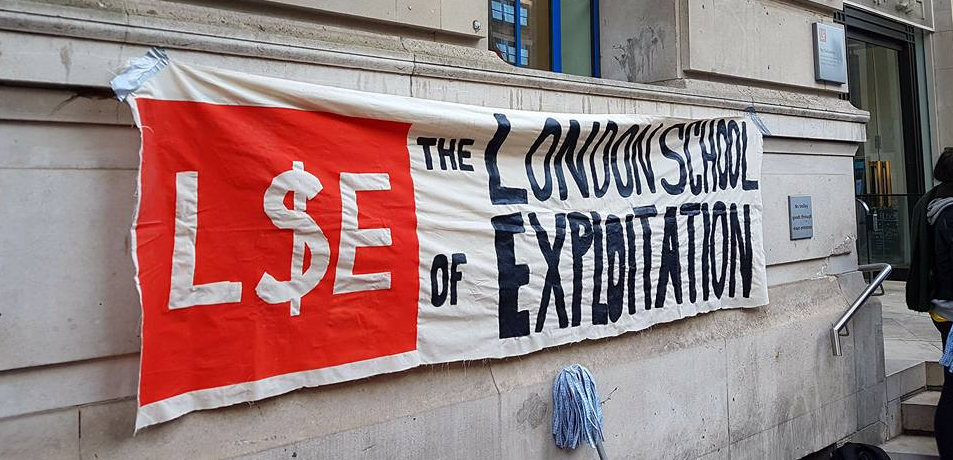
Yesterday, on what felt like this spring’s first day, subcontracted cleaning staff at the London School of Economics (LSE), represented by United Voices of the World union (UVW), began a two day strike against their employer, Noonan, and the university that contracts them.
Workers voted to strike – 100% in favour with a 70% turnout – in their fight to get sick pay, maternity/paternity pay, and pension contributions at parity with management’s. The cleaners currently get 1%, compared to the managers’ 16%.
Cleaning can make people sick – handling chemicals, removing waste – but as one striking cleaner, who asked for anonymity to avoid victimisation, said, “It’s like you’re a pay as you go person. When you come to work, you get paid. When you don’t, you don’t … When I’m sick, I’m forced to come to work. How am I going to pay my rent?”
The cleaners, supported by students and other staff, picketed from 6am until 12.45, when 100 or so people marched down Kingsway to the LSE management’s office building.
Security tried and failed to eject the group, and it was only with the targeted, politically motivated arrest of a woman activist – who’s previously been prosecuted for ‘criminal damage’ after police failed to remove a sticker (yes, really) – that that the demonstration left, together marching towards Charing Cross Police Station.
Noonan and LSE, who one cleaner today described as “hiding behind each other”, have consistently refused to even meet with the workers, their argument being that they do not recognise UVW. Management’s refusal to deal with the cleaners’ chosen representatives has nothing to with legal protocol, and everything to do with the fact that Unison, the official union for non-academic staff at LSE, are unwilling to fight. As one cleaner said: “Unison have been at LSE for many, many years, and they never fought for cleaners.”
After today’s action, Noonan have agreed to meet with UVW on Monday morning. UVW have vastly improved their negotiating hand through the strike, and have little issue with continuing industrial action if Monday’s meeting does not yield major concessions.
After their December victory against Harrods’ billionaire owners, UVW are showing again that only member led trade union militancy can take back wages from profit, and power from bosses. “What have you got to say to other cleaners, chefs, nurses, working today,” I asked one striker: “strike, it’s the only way that can change things.”
Besides the above, this struggle shows three things about how workplace struggles can succeed today. The first is that students have a vital role to play in all workplace disputes at their university, and that those same disputes are crucial for making radicals of students; in May ’68, French students “learned all sorts of things that a conventional university is designed not to teach them,” wrote Daniel Stringer.
UVW’s strike might have happened without students’ support, but its success in terms of size, atmosphere, and money raised would have been diminished without it. And the enthusiasm of the student support group – which is relatively narrow, but very deep — tells us something about the changing student experience: “since the fees went up, there’s been a move to a ‘student as client’ model, and some students have bought into that,” said one key student supporter said today, “more and more, students go to the library on their own, they eat on their own, and people are very isolated.”
As Plan C member and #RentStrike activist Callum Cant highlights, in the past five years the number of students seeking mental health support has increased by 50%. These conditions mean that people studying need a sense of solidarity more than ever. Students supporting workers’ strikes “helps builds up community, and once people get talking, they start understanding what other people’s problems are, how that relates to their problems, and what they can do to start solving these collective problems” the same supporter said.
Second, every single cleaner on strike is BAME, the vast majority are migrants (mainly from Latin America and the Caribbean) and most are women: the type of people in the most precarious jobs today, and the workers that are most capable of leading any new rank and file movement. “We are the driving force,” one woman on strike said today, immediately after which a Met officer arrested the woman activist mentioned above, cutting the interview short. So, whilst the leadership of Unite are ‘suppressing’ reports of violence against women officers, other unions are being directed by majority women workers – and winning.
As UVW organiser Petros Elia said yesterday: “migrant workers, beyond the immediate benefits they get for themselves and their colleagues, are also encouraging other workers to take action: they’re not a drag on wages, they’re fighting for everyone’s.”
Third, UVW’s actions are organised — and for bosses, damaging — at the same time as being really, really fun. Group confrontations — shutting down roads, occupying buildings, saying ‘no’ to the Met – near inevitably involves arrests. But they also give a sense of popular power and, as Daniel Stringer put it, of ‘popular wit’ that bring workers and supporters together. It seems highly unlikely that their near carnival outside Harrods’ cost the union; far more likely that it was a major part of workers’ win there.
Organising towards strikes have to be serious, but people “learn to dance at UVW demos”, as one student supporter said, and then: “organiza la rabia para defender la alegria” — “organise rage to defend joy”.
—
You can donate to the LSE cleaners’ strike fund here.